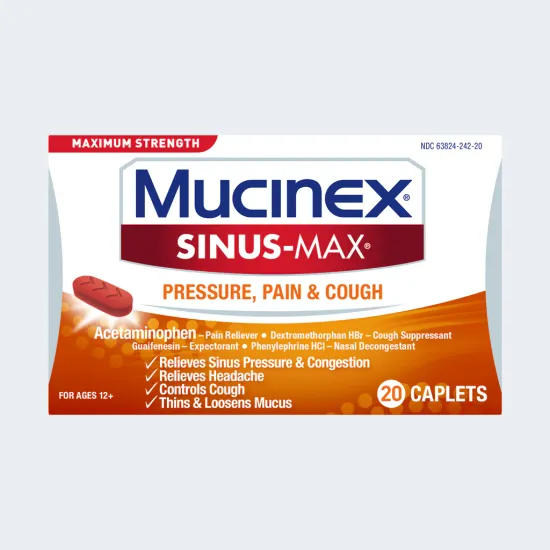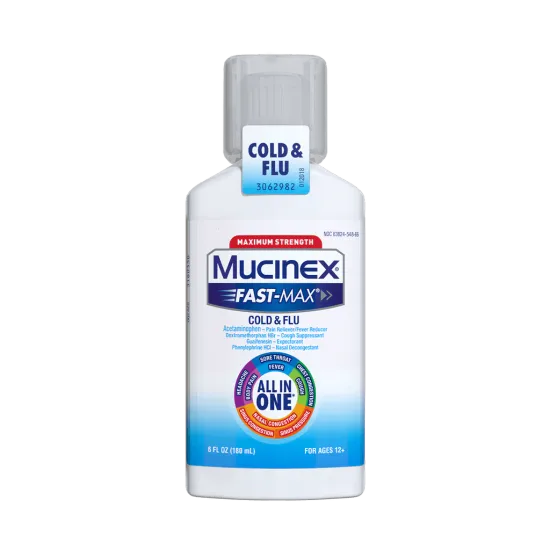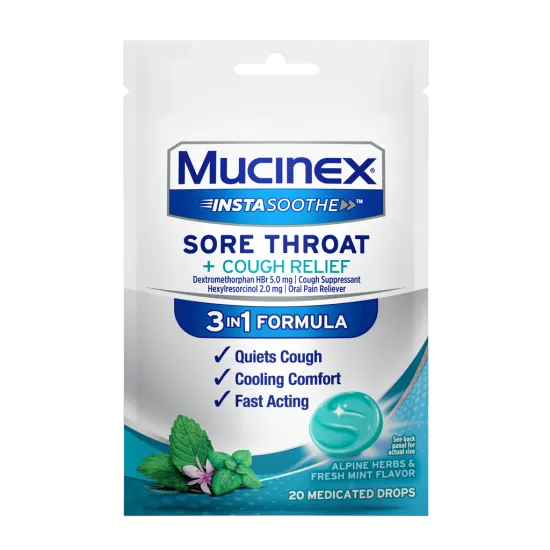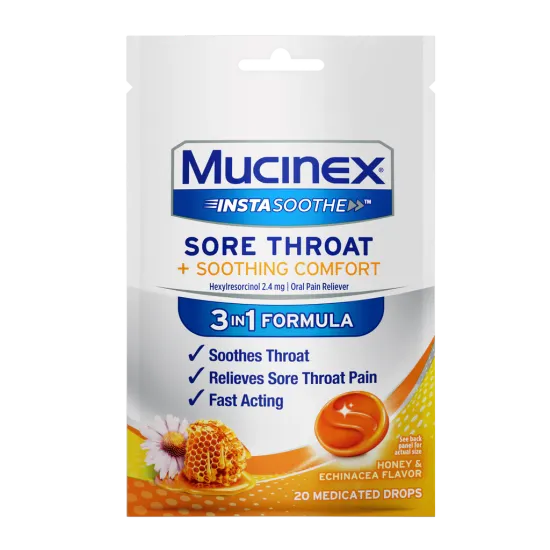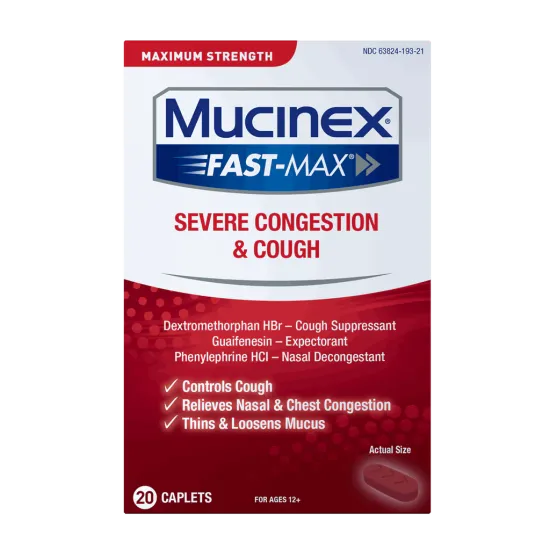
How Do Nasal Decongestants Work to Help You Cough Less?
Shop the article
23 JAN 2024
When you have a cough, you'll try just about anything to feel better. Over-the-counter cough medications provide a convenient option, but which should you choose? Nasal decongestants are one potentially helpful choice. While they aren't designed specifically for cough relief, they may help minimize your symptoms while bringing additional cold-fighting perks.
What Do Nasal Decongestants Do?
Nasal decongestants are remarkable allies when it comes to providing relief from coughs and congestion. These medications work by targeting the root cause of nasal congestion: swollen blood vessels in your nasal passages. When you're dealing with a cold, allergies, or sinusitis, these blood vessels can become inflamed, leading to a stuffy nose and postnasal drip, which often triggers coughing.
Phenylephrine HCl vs. Pseudoephedrine: The Oral Nasal Decongestant Active Ingredient
Take a peek at the product ingredients, and you'll likely see phenylephrine or pseudoephedrine on the list. Depending on the product, Mucinex® cold and sinus medicines contain one of these nasal decongestants as active ingredients. Mucinex® Fast-Max® Day Time Severe Congestion & Cough and Mucinex® Sinus-Max® Pressure, Pain & Cough both contain phenylephrine, whereas Mucinex® D contains pseudoephedrine.
So, How Does a Nasal Decongestant Work?
Nasal decongestants, including phenylephrine and pseudoephedrine, work by constricting blood vessels. This allows more air to pass freely through your nose and leads to drier nasal tissues and less mucus draining down the back of your throat, also known as postnasal drip. This mucus drainage can cause coughing and other related problems such as throat pain and difficulty swallowing. In other words, as nasal decongestants reduce postnasal drip, you'll tend to cough less often and as the inflammation subsides, you will experience less pain and discomfort.
When you have a cough, there’s a good chance you’re dealing with other symptoms as well, such as sinus pressure and a stuffy or runny nose. As nasal decongestants constrict your blood vessels, these symptoms also tend to improve. The less congested you are, the more likely you’ll be able to rest and recover.
How to Treat Nasal Congestion Symptoms
If you take a multi-symptom cough medicine, such as Maximum Strength Mucinex® Fast-Max® Cold & Flu (All-in-One) Liquid, you'll reap the benefits of a nasal decongestant — plus an expectorant to loosen mucus, a cough suppressant to minimize coughing and a pain reliever for any throat or sinus pain.
Lifestyle habits can also go a long way toward easing cough symptoms, on their own or paired with medication.
Stay hydrated
Drinking plenty of water or other fluids helps thin the mucus in your throat. This thin mucus is easier to expel from your throat and respiratory tract, reducing the urge to cough. In essence, staying hydrated complements the action of nasal decongestants by making the mucus in your throat less thick and sticky, helping you cough less and breathe more comfortably.
So, whether you prefer plain water, herbal tea, or warm broth, increasing your fluid intake can be an effective, natural way to alleviate that persistent, annoying cough and facilitate the healing process. Remember, a well-hydrated body is better equipped to tackle the discomfort caused by congestion and coughing, so sip wisely for relief.
Suck on a lozenge
Throat lozenges are known as cough drops for good reason. Sucking on a throat lozenge can be a soothing remedy for that pesky, tickling, cough. These little wonders are designed to dissolve slowly in your mouth, helping with moisture and containing active ingredients like dextromethorphan HBr (a cough suppressant) or hexylresorcinol (often used as a local anesthetic), that can help ease irritation and subdue cough symptoms.
The act of sucking on a lozenge also stimulates saliva production, which naturally lubricates your throat and provides relief from the dry, scratchy sensation that often triggers coughing fits. Mucinex® offers several options of throat lozenges or cough drops to help ease these symptoms.
The gentle, cooling sensation of InstaSoothe™ Sore Throat + Cough Relief medicated drops in Alpine Herbs & Fresh Mint flavor can further soothe your irritated throat, while the InstaSoothe™ Sore Throat + Soothing Comfort medicated drops in Honey & Echinacea flavor offer fast-acting relief of sore throat pain. So, the next time you find yourself with a nagging dry cough, consider reaching for a throat lozenge to experience quick relief and the added bonus of a pleasantly soothing taste.
Use a humidifier
Dry air can worsen throat pain and coughing. A humidifier can help by keeping moisture the air you breathe. Using a humidifier can be a game-changer when you're dealing with a persistent cough, especially in dry indoor environments. These handy devices work by releasing moisture into the air, effectively increasing humidity levels and preventing the air from becoming too dry. This added moisture can be incredibly beneficial for your respiratory system, as it helps keep your throat and airways moist.
When the air is adequately humidified, it reduces irritation and inflammation in your throat, making it less likely for that tickling, cough-inducing sensation to occur. By using a humidifier, you create a more comfortable atmosphere, allowing you to breathe easier and cough less. It's a simple yet effective way to enhance your overall well-being during cough and cold season or when you're experiencing dry air indoors.
Get rest
Skimping on rest when you have a cough or cold makes healing tougher. Getting sufficient rest is a crucial component of a speedy recovery when you're grappling with congestion and a persistent cough. Your body needs extra energy to combat the illness, and rest is the most efficient way to channel that energy into healing.
When you sleep or rest, your body can redirect its resources toward bolstering your immune system and repairing damaged tissues, including the irritated throat and inflamed airways responsible for the cough. Rest also allows your body to better utilize any medications or natural remedies you're using to manage your symptoms, promoting their effectiveness. By prioritizing rest, you not only give your body the time it needs to heal but also ensure that you'll feel better faster and be back to your healthy self in no time.
Congestion Symptom Relief with Mucinex®
Mucinex® understands that when it comes to relieving sinus, nasal, or chest congestion to help ease coughing, individual preferences and needs vary. That's why we offer a wide range of effective solutions in various forms.
Our liquid formulations can provide fast-acting relief, making it easier to swallow for some and to start feeling better quickly. If you prefer the convenience of caplets, Mucinex® has you covered with options formulated to tackle congestion effectively. And for those looking for a soothing remedy that combines relief with a pleasant taste, our medicated drops are a great, effective choice.
Regardless of which product you choose for temporary symptom relief, you can trust that Mucinex® offers a diverse array of products designed to address your specific chest and nasal congestion needs, so you can find the symptom relief you're looking for in a form that suits you best.
To view all Mucinex® collections and find which product is best fit for your symptoms, check out our Product Finder.
Resources
- Harvard Health Publishing (2023), No Coughing Matter
- Cleveland Clinic (2023), Nasal Decongestant
- GoodRx Health (2023), Got Postnasal Drip? Here are 6 Ways to Treat It
- Everyday Health (2017), 8 Ways You Could Be Making Your Cold Worse

